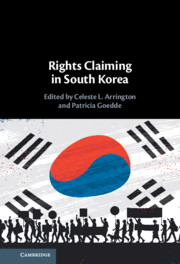Book contents
- Rights Claiming in South Korea
- Rights Claiming in South Korea
- Copyright page
- Dedication
- Contents
- Contributors
- Acknowledgments
- Abbreviations
- Introduction Rights in Action
- Part I Rights in Historical Perspective
- Part II Institutional Mechanisms for Rights Claiming
- Part III Mobilizing Rights for the Marginalized
- 9 From “We Are Not Machines, We Are Humans” to “We Are Workers, We Want to Work”
- 10 From Invisible Beneficiaries to Rights Bearers
- 11 The Politics of Postponement and Sexual Minority Rights in South Korea
- 12 Discovering Diversity
- Part IV Shaping Rights for New Citizens and Noncitizens
- Conclusion Findings and Future Directions
- Index
- References
10 - From Invisible Beneficiaries to Rights Bearers
How the Disability Rights Movement Changed the Law and Korean Society
from Part III - Mobilizing Rights for the Marginalized
Published online by Cambridge University Press: 17 April 2021
- Rights Claiming in South Korea
- Rights Claiming in South Korea
- Copyright page
- Dedication
- Contents
- Contributors
- Acknowledgments
- Abbreviations
- Introduction Rights in Action
- Part I Rights in Historical Perspective
- Part II Institutional Mechanisms for Rights Claiming
- Part III Mobilizing Rights for the Marginalized
- 9 From “We Are Not Machines, We Are Humans” to “We Are Workers, We Want to Work”
- 10 From Invisible Beneficiaries to Rights Bearers
- 11 The Politics of Postponement and Sexual Minority Rights in South Korea
- 12 Discovering Diversity
- Part IV Shaping Rights for New Citizens and Noncitizens
- Conclusion Findings and Future Directions
- Index
- References
Summary
Government policies and South Korea’s legal system historically regarded people with disabilities as objects of compassion and protection, rather than human beings equal to nondisabled people. Starting in the 1980s, disabled people began protesting for equal worth and dignity. People with disabilities then established organizations and sought changes in policies and the legal system with support from civic groups and the media. Their claims, mostly grounded upon natural law ideas and the equality protections in the Constitution, were for formal equality. The chapter traces the struggles by Korean disability communities, civic organizations, and lawyers to raise public consciousness and press the National Assembly to revise or enact laws, such as the Disability Discrimination Act (DDA). The chapter also examines the outcomes of movements for the rights to mobility, independent living, and special education. It concludes by highlighting shortcomings in Korean disability law and suggests necessary reforms for a more inclusive and integrated society.
Keywords
- Type
- Chapter
- Information
- Rights Claiming in South Korea , pp. 217 - 235Publisher: Cambridge University PressPrint publication year: 2021

